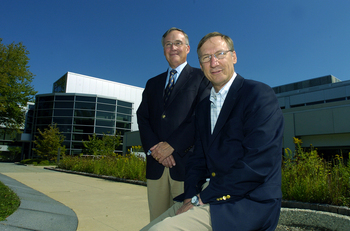Pfizer departure paved the way for major university expansion

Angela Cesere
Dr. Ora Pescovitz, CEO of the University of MIchigan Health System, accepts the 2009 Deal of the Year award from Michael Finney of Ann Arbor SPARK on behalf of U-M's purchase of the former Pfizer campus.
Ann Arbor's lamentable loss is also an unmistakably significant opportunity.
The 2008 departure of pharmaceutical giant Pfizer from its 174-acre campus in northern Ann Arbor was the single biggest blow to the region's economy in decades.

Dr. James Woolliscroft, dean of the University of Michigan Medical School, and Stephen Forrest, vice president for research, at the former Pfizer facility. (Photo by AnnArbor.com's Lon Horwedel)
U-M, which acquired the site in June for $108 million, plans to hire 2,000 to 3,000 workers to populate the 2 million square feet of facilities over the next 10 years.
The acquisition of the ex-Pfizer site, renamed the North Campus Research Complex, is AnnArbor.com Business Review's "Deal of the Year" for 2009.
"It's truly a watershed moment in the university's history - probably the biggest event in 50 or maybe 100 years," U-M Vice President Stephen Forrest said recently.
U-M is still formulating its strategy for the site, but several implications are immediately clear:
• The site will allow U-M to expand its $1 billion annual research budget. U-M President Mary Sue Coleman recently called for the university to aim for a $2 billion research budget by 2017.
• The site will house a wide range of research, but life sciences and alternative energy are likely to comprise most of the space. Cross-disciplinary research relationships will encourage idea sharing and innovative new technologies.
• The university will leverage the site to tighten its relationships with new and existing industry partners. The university could also use the space to house its own startup companies. "It's forcing us all to think about new ways to partner, new ways to research, new ways to be inventive," Forrest said.
• The acquisition is a catalyst for a new discussion about how the university could pursue new transportation options to better connect its North Campus and Central Campus, and medical facilities. Light rail, trolleys and aerial tram are not out of question.
• Political officials and business leaders have generally come to accept the loss of tax revenue in exchange for the economic stability the university brings to the site. The 2008 taxable value of the property and land was $147.7 million.
U-M expects to begin moving workers into the site in early 2010, although the process is proceeding methodically. The university has assembled several committees with dozens of university officials and business leaders to formulate strategy for the site's future.
"This opportunity will enable us at the University of Michigan to do something that no other academic institution in the rest of the nation can possibly do," U-M Health System CEO Ora Pescovitz said recently. "It will position us as a state, as a region and certainly as a complex to do unsurpassed things and this is both from the perspective of research and also in the public-private arena to accomplish goals that we never thought possible before."
Contact AnnArbor.com's Nathan Bomey at (734) 623-2587 or nathanbomey@annarbor.com.


Comments
Sylvia Lang
Wed, Nov 11, 2009 : 10:05 a.m.
Thanks, Nathan, for several of the facts about upcoming employment opportunities for workers.